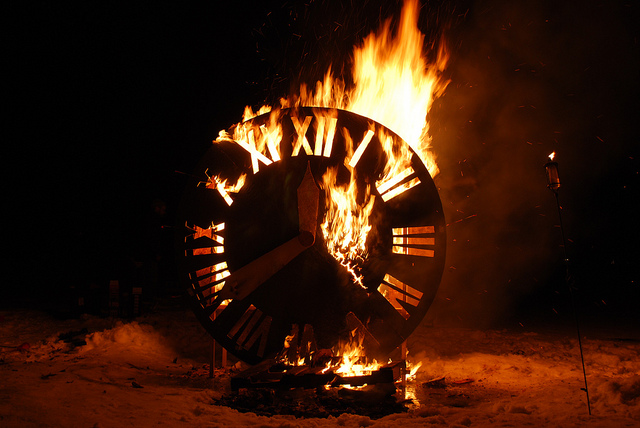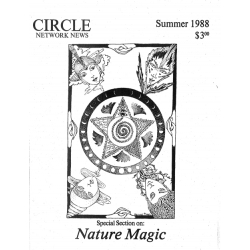Before beginning I’d like to express my enthusiasm for the future of The Wild Hunt. Writing for and about this extended community has been both challenging and invigorating. One of the perks of the job is in the education. Every time I write an article or retell someone’s story, I learn something new. That’s the gift that I receive in return for my time and effort. In addition, I am ever thankful to Jason for instilling his trust in me to help usher in a new decade for this amazing resource.
That brings me to the subject for the day: resources or, more specifically, archival resources. Over the past 10 years Jason has been cataloging Pagan news. The Wild Hunt has become an historical archive containing data on many past events. Each post is a point in time providing a snapshot of what’s going on – the good and the bad; the progressive and the not so progressive and the downright ugly. It catalogs our successes and our failings as well as capturing the whimsy in celebration and expansion.

Photo Credit: Flickr’s timetrax23
Archival research has always been essential to much of my work and that remains true to this day. As I child I was told to never make a statement without 3 supporting facts. My teacher would often say, “Prove it.” I took her advice to heart and will do an excruciating amount of digging before making any type of claim. Now I find something very exhilarating in the finding of the “tiny needle in a haystack” after hours digging through archival material.
However the preservation of historical data serves more than just research junkies like me. There is a higher purpose. The founders of The Adocentyn Research Library explain, “We are living in a period of growth, diversity and change akin to the first few hundred years of Christianity. Future scholars shouldn’t have to rely on the discovery of a future Nag Hammadi library in order to understand our diversity and our history.” This is a project whose time has come.
Here’s an example from my favorite subject: film history. At the turn of the 20th century, movies were considered lowbrow entertainment or sideshow novelties. Nobody thought much more about the filmed product. Technical innovators focused on production while producers focused on the building of a commercial venture. Nobody stopped to catalog or archive the footage being shown. Nobody considered or knew how highly flammable the early celluloid material would be. The American film Industry focused on the doing and not the archiving. Consequently most early films are lost in whole or in part. The historical data contained in those early film reels and in the production processes are completely gone. That’s nearly 40 years of lost material.

Photo Credit: Flickr’s Sonear
The Pagan Movement, as it’s been called, is now well beyond the stories of Gerald Gardener, Aleister Crowley, Dion Fortune and the like. Up to this point the focus has been more on the doing and not the archiving. No doubt much has already been lost. Regardless we still have many long trails of breadcrumbs through our cultural forest that can be captured. Sabina Magliocco, one of the founders of the Pagan History Project says:
It’s clear that we’re now one of the fastest-growing new religious movements in the world. The documentation of our early history is thus doubly important, especially as the movement is changing in important ways. The elders who were involved in the movement’s early days are now in the twilight of their lives; we have already lost a number just in the last year. Recording their histories and archiving documents from the beginning of the diffusion of modern Paganisms in the US will help preserve that history for future historians.
Just in the past two weeks, Judy Harrow’s crossing came as a surprise to many. Director Holli S. Emore says, “At Cherry Hill Seminary we are all too painfully aware of how the loss of someone like Judy Harrow inserts a sort of glottal stop in the narration of how we came to be where we are today. Anything we did not learn from Judy before last Friday is now gone forever.”
There are lessons to be learned from past experience at all levels of practice. What worked and what didn’t? Why did this group fold and this one last for 30 years? Shauna Aura Knight is an author and presenter whose focus is on Pagan leadership skills. She says:
When I travel and teach Pagan leadership, what I see over and over is reinventing the wheel … I’ve seen local Pagan unity-type organizations–with actual not-for-profit status–folding because the leaders couldn’t sustain the organizations any longer. Thus those resources become lost, and any future group has to start again.
Fortunately a number of projects have formed or are forming to fill this very need. Located in California’s Bay Area, The Adocentyn Research Library aims to preserve an expansive amount of material from a variety of religious communities “including indigenous, tribal, polytheistic, nature-based, and/or Earth-centered religions, spiritualities and cultures around the world and throughout human history.” They currently have cataloged more than 6,000 books and are working with the “Lost and Endangered Religions Project on conservation and storage of Pagan materials from India, Turkey and Guatemala.”
Similarly, in southern Delaware, the Assembly of the Sacred Wheel is raising money to finish the construction of the New Alexandrian Research Library (NAL). The “Library will be collecting materials from all religious traditions focusing on their mystical and the spiritual writings.” Founders hope that NAL will serve as both a functional community and research center as well as become a “cornerstone for the new magical Renaissance.”

Photo Credit: Circle Sanctuary, Circle Magazine
All archiving doesn’t need to be done by librarians and institutions. Several groups have digitized their own newsletters such as the Georgian Wicca Tradition and the Covenant of the Goddess. Back Issues of old print periodicals are available for purchase such as Circle Magazine whose offers issues dating back to 1980 when it was still called “Circle Network News.” The Founders of Adocentyn say “Archiving our history ourselves is important because we take our movement seriously, know how parts relate to one another, and understand it.”
Another recent development is the effort to capture individual stories. Shauna Aura Knight is co-editing a new anthology for Immanion Press has that very aim. She says, “I hope to start collecting the stories of what works and how leaders can use that, but also, what hasn’t worked. What are the mistakes we want to avoid in the future?”
The Pagan History Project has a similar objective. Sabina Magliocco explains:
The Pagan History Project is modeled after other oral history projects such as the American Folklife Center’s Veterans’ History Project. We rely on community members to record oral histories from other community members. These digital documents will be posted on a website and made available to other community members and scholars. … At this point, we are focusing on interviewing elders in our community who were involved with the inception of Paganisms in the US.
The Project seeks to create a “mythic history” that captures our humanity through the recording of voices. Currently organizers are looking for volunteers to go out into their communities and interview anyone willing. In this way future generations can benefit from the experiences of even those who have chosen to lead a quiet, non-public life. Holli S. Emore says,”For the many mystics among us, and most certainly for reconstructionists, an understanding of our historical roots has proven to be a vital part of our spiritual journey … We are deeply enriched by learning the many layers and traces of Pagan history.”
The preservation of the past serves to not only enrich our present experience but to help build a stronger future. Together all these records will tell the greater story of a Movement or Movements with all the nuance and color one might expect. And, if nothing else, these archives will help future historians, research junkies and Wild Hunt journalists look back and say, “So that’s how it all came to be…”
The Wild Hunt is not responsible for links to external content.
To join a conversation on this post:
Visit our The Wild Hunt subreddit! Point your favorite browser to https://www.reddit.com/r/The_Wild_Hunt_News/, then click “JOIN”. Make sure to click the bell, too, to be notified of new articles posted to our subreddit.
Very interesting topic.
I have discussed this many times but we always find a problem, one which is very common when ti comes to Paganism: the lack of monetary resources.
Unfortunately, well organised infrastructures cost money, and the majority of pagan projects we have nowadays are based on free platforms (like Internet) and unpaid work from volunteers.
I would be really pleasant to see a future where members of the pagan community can make a living of something that contributes back to the community in the form of something very consistent. But we still live in a “free” culture 🙁
As a librarian, I’m so happy to see this conversation happening. I’ve worked extensively with collections in the past that at the time would have seemed like nonsense (postcards, random personal belongings etc.) that have turned out to be of critical historical and social importance later on down the line. Money and resources are a nightmare to contend with but I would argue that pursuing funding bodies that deal with heritage collections or trying to encourage national collections to help out could be a way through those challenges.
You know how hard it is to get public bodies to subsidise projects focused on religious minorities, or those they don’t consider “useful” for the “general society”. Otherwise, projects like the Doreen Valiente Museum wouldn’t have so many problems on finding some sponsorship! (And that’s quite a good collection compared to any modern archives we could create now).
Nevertheless, I am definitely not saying that we should stop planning such projects – on the contrary! Just that it would be definitely better with more resources!
Some few years ago I donated thousands of Pagan magazines I had collected since 1980 to the New Religious Movements Collection at the University of Alberta in Edmonton. When I die my personal papers will go there. This year I wrote and published a memoir. Well-meaning though these internal community projects are, I don’t know that they will be around in a hundred years while, barring some great civilization collapse, the U of A will be.
I love the idea the digital records represent: information stored without the expense that comes with storing hard files, or the environmental impact caused by creating paper in the first place.
I loathe the reality that digital records represent: something that can vanish in the blink of an eye, should we experience a loss of technology, a surge of power, or a variation of magnetic waves.
Digitizing our records is better than doing nothing but depending on our own memories, but let’s not kid ourselves into thinking that just because it’s easy, it’s also durable.
There is a massive amount of material already collected at the Davidson Library at the University of California at Santa Barbara. When J. Gordon Melton retired, he gave his library and papers to them, which became the American Religions Special Collection. Since then, they’ve continued to take things, including Neopagan ephemera and publications, assuming they don’t have it them in the collection already. I approached them when Isaac was dying, and they were thrilled to take all his papers, photos, all sorts of stuff. I’m still sending things as I find them.
My terror was that thirty years down the road his life’s work would be mouldering in a storage locker somewhere when I could no longer take care of them. Isaac and I discussed giving his things to one of the Pagan archiving project, but at the time no one really had the infrastructure yet to support their intentions. Having his things mouldering in someone else’s storage locker was not an acceptable alternative.
Now his work is being properly stored and cataloged and will be available to legitimate researchers (as opposed to the idly curious) for generations to come. There are also restrictions placed on reproduction of material and on access to material and photos related to living people.
I applaud and admire those who are working to preserve our heritage, but as has been stated by others, the long-term track record of modern Pagan organizations is not very good. University libraries have the proper infrastructure and are not going to be disappearing in a generation or two.
I would want my writings to be availiable to anyone, especially the idly curious because out of idle curiosity can come real interest. The thought of a gate-keeper to information chills my blood.
That’s a very valid thought, Charles. However, what the library has is much, much more than just his writings. Some very private material is included, which shouldn’t be available to just anybody. However, there is a possibility that they’ll digitize at least some of it, so in the future a good deal of it may be available for browsing.
Thank you for writing about this. I recently posted about the importance of preserving Pagan papers, especially from a legal standpoint: http://hecatedemeter.wordpress.com/2014/03/27/preserving-pagan-papers/
The Pagan History Project is certainly considering allying with a larger academic organization in future, for exactly the reasons Phaedra cites. We’ve already discussed becoming part of the collections at Cal State Northridge, but disruptions and adverse conditions exist in the academic world also, which made such an alliance inappropriate at present. We’re definitely not ruling it out in the long term. The goal for now, however is to complete our present infrastructure (website, cloud storage, hard storage, backup, P.O. Box, etc etc – indiegogo campaign coming soon!!), and build the materials and make them accessible in a safe, organized and academically useful (i.e. coded) manner.
I have seen this sort of thing go so wrong so fast, I have my doubts. A similar archive was established in Physical Culture, with the understanding the archive was there to support the community of trainers, historians and workers in the field. That lasted until the University holding the archive decided to deny access to anyone who might possibly derive a theoretical financial benefit from the information. The archive, in effect, was closed to outside researchers not in the University system.
(re-creating a comment from this morning that Disqus ate)
This project is already underway at the Pagan Archives Network, and I am sure that the university librarian who designed it would appreciate some helpers.
A lot of my own Pagan materials from the 1960s–1980s went to the University of California, Santa Barbara’s, American Religions Collection, which has is searchable..
Anyone looking to preserve digital media (web sites, blog posts, online newsletters, videos, audio recordings, etc) can use the free site archive.org to save those things. Today I’ve been going through their website archiving service (The Wayback Machine) to make sure my favorite old recaps from Television Without Pity are archived so I can still read them after the site closes down!
This post has warmed my polytheistic librarian heart. I’m glad this is being done and discussed.
I’ve written a detailed history of our coven, which was founded in 1992. Where would I send this? Who would be interested in preserving it?